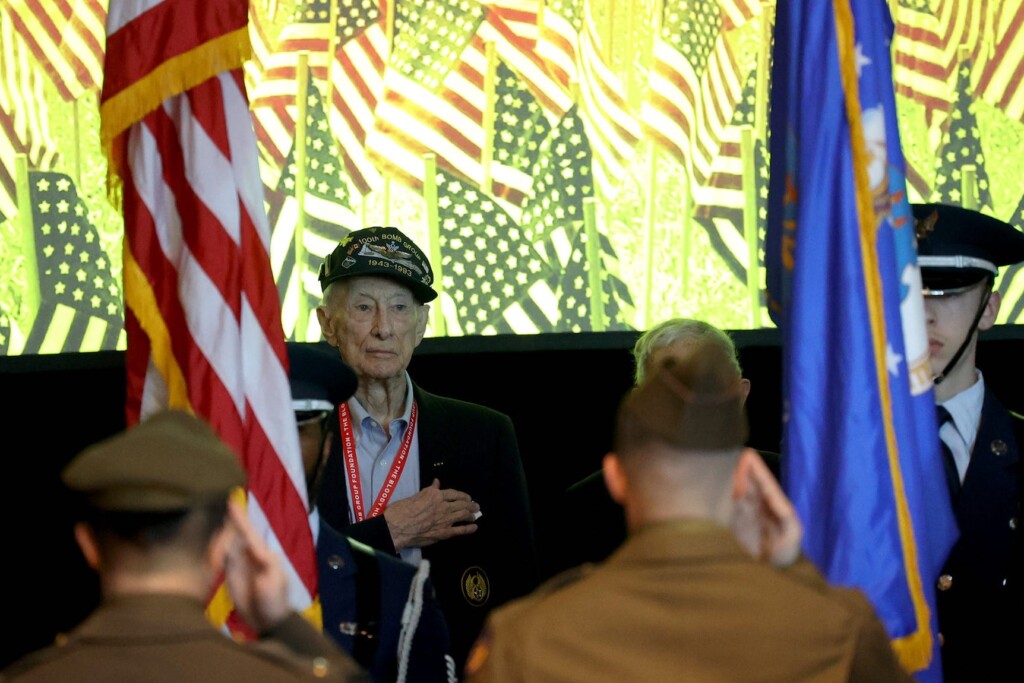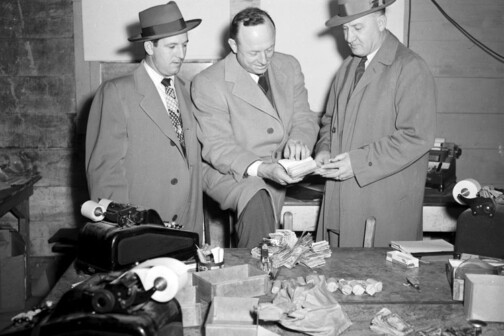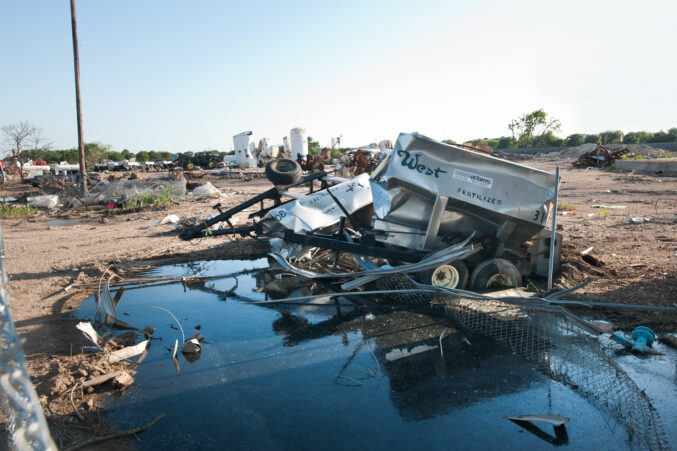John “Lucky” Luckadoo may be the most popular man in Dallas. In January, he met Tom Hanks and Steven Spielberg at the Hollywood premiere for Masters of the Air, an Apple TV+ miniseries depicting World War II’s 100th Bomb Group. On The Late Show with Stephen Colbert, actor Austin Butler named-dropped Luckadoo. “I’m sorry — what’s his name?” Colbert responded. “Yeah. Amazing,” Butler said.
Luckadoo is one of the last living members of the 100th Bomb Group. Some 80 years ago, he flew 25 combat missions in Nazi-occupied Europe in a B-17 Flying Fortress, acting as pilot and co-pilot in near-impossible circumstances. The 100th Bomb Group earned the nickname the Bloody Hundredth from its severe casualty rate. Around 77 percent of its original members were wounded, killed, or captured. The total number of casualties of the group’s parent division, the Eighth Air Force, was 26,000 — a casualty rate of about 67 percent.
“What the 100th lacks in luck, it makes up for in courage,” 100th Bomb Group leader Lt. Col. John Bennett once remarked.
Luckadoo, like his peers, had courage. But he also had luck (his biography is titled Damn Lucky). He turns 102 on March 16, can still drive, and lives independently at Presbyterian Village North in North Dallas, where he’s been watching most of the episodes of Masters of the Air with the community. The show’s finale is set for March 15, the same day Apple TV+ premieres a Hanks-narrated documentary about the Bloody Hundredth, featuring Luckadoo.
I met up with Luckadoo in early March to talk about the grim realities of serving in World War II, his life in Dallas, and how it felt to have his story told by Hollywood. (Our conversation has been edited for brevity and clarity.)
Why’d you want to fly in the war?
One of my best friends [Sully Sullivan] and I graduated from high school in 1940, a year and a half before Pearl Harbor. We both wanted to fly. We thought it was glamorous, we thought it was far better than being in-the-ground troops and wallowing around in the mud.
And we decided that the best thing for us to do — because America was eventually going to become involved — was go to Canada, and join the Royal Canadian Air Force and get our wings and commission. Once America became involved, then we could transfer over and we’d be ahead of all of our contemporaries.
But had you even been in a plane?
Yeah. We both had sort of introductory rides. And so we had some recognition of what flying involved.
So we applied to the Canadian Air Force, and they said, ‘Sure, we’d love to have you. Here are the papers.’ At the end [the paper] said because you’re underage you’ll have to have parental consent. My best friend was the only child of a World War I veteran who had been mustard-gassed and died a horrible death before he even knew his son. He was all his mother had. So when we presented the plan to her, she said, ‘Well, Sully, if you really, honestly believe that this is what you should be doing, you have my blessing.’
So I thought I’ll go home and probably get the same reaction. I told my mother that Mrs. Sullivan had agreed to let Sully go and she said, ‘I certainly hate to see you do this. But if Mrs. Sullivan can give up her only son I don’t see how I could stand in your way.’
My dad came home and he heard the plan and he said, ‘You blithering idiots don’t have any idea what you’re doing. Over my dead body, would I ever give you my consent, so you get back in school.’
So I went to college [at the University of Tennessee Chattanooga]. And then Pearl Harbor happened. There wasn’t any question that I was going to serve.
If you volunteered, you were allowed to choose the branch of service. And so of course, I applied as an aviation cadet and ended up graduating from what was known as multi-engine flying school in early 1943.
Where’d you go after the training?
They sent us to what was known as the 100th Bomb Group. There were four squadrons, and they sent each squadron to a different base to train crews that were then going overseas. Well, that lasted a couple of weeks, or three weeks at the most, and then they pulled us all back together again in Kearney, Nebraska. None of us had ever been in a B-17 before. [That’s the plane the Group trained with at various bases in the U.S. and what it used in Europe].
And they said you’re going to be killed anyway. So you might as well go to combat.
So after a few weeks of learning a B-17 you were scheduled to go to Europe?
Yeah.
What do you remember about that flight over?
I remember two things very, very vividly. We couldn’t make it unless we had a favorable tailwind. We extended the range of the B-17, which was normally about seven hours, to 12 hours. We flew, if we had a good tailwind, from Newfoundland to Scotland. So we had to wait for the weather to be exactly right for us to take off.
While we were waiting, a pilot of the crew that I was assigned to took it upon himself one night to go across the base and shack up with a WAAF, a British auxiliary forces gal. He ended up with a raging case of V.D. in the hospital.
Yikes.
He was bedridden for two weeks. The rest of the group went on overseas when the weather permitted, and they all made it. But our crew was the only one left and we had to sit there and play cards or occupy ourselves while he recovered.
When they released him from the hospital, he was so weak he couldn’t stand up. And he says, ‘Lucky, I guess you’re gonna have to fly because I can’t.’ And I said, ‘That’s pretty darn obvious, isn’t it?’
I was second in command of the crew, the 10-man crew.
We took off. The end of the runway was a 100-foot cliff down to the ocean, and we sunk right down to the whitecaps because we were so heavy. We had to fly along, just barely keeping out of the water, keeping our feet dry for two or three hours until we burned off enough fuel to lighten our load and we could start stepping up to a decent altitude. But we made it.
That was as scary as combat, because the elements were against us. The odds were against us. We were really struggling to survive. It was a bitter lesson that we were subjected to before we ever got to face the enemy.
What was the strategy when you got to Europe?
The strategy was that Americans would go out in broad daylight at high altitude, 25,000 to 29,000 feet in unpressurized airplanes, which meant we had to be on oxygen in order to survive. [There was] bitter cold — 50 to 60 degrees below zero. We were doing daylight bombing.
The British begged us to give up that idea of going out in daylight. They had tried it and been cut to ribbons. They said join us at nighttime bombing, and we’ll double our horses. We’ll bring Hitler to his knees that way. They pled with us and they pled with Churchill, who pled with Roosevelt. President Roosevelt said no.
So we continue to go out day after day. We mostly were flying by ourselves [without fighter jet escorts, which ran out of fuel before the B-17s, leaving them isolated.]
And that must’ve left you vulnerable?
Very vulnerable. We really started taking very heavy losses. And neither Hitler nor the head of the Royal Bomber Force, Sir Arthur Harris, believed that we could ever withstand our losses. But what Pearl Harbor had done was really galvanized the country in support of the war effort. Women came out of the homes and went into the factories. They learned how to build airplanes, locomotives, and trucks, and we outproduced the world.
What went through your head on those missions?
Mostly how in the world did I ever let myself get in that spot. Truthfully.
You’d have anti-aircraft defenses coming up and trying to knock you out of the sky, fighters coming in and shooting the heck out of you. You’re like, oh my goodness my chances of survival are about that big. How did I ever let myself get in this spot? But you were there, and you had a job to do.
You saw your buddies go down, and there were never any funerals. There were never any memorials. There was never any reference to the fact that they’d ever been there. They were just gone. And you just went back and got in the airplane the next day.
How…
Don’t ask me how. I really don’t know how we managed to do that. But we just stayed focused on our job. And we said, we’re here. This is what we’re ordered to do. So let’s do it. Get it over with — and prevail.
When you got back to the U.S. after the war ended what was your plan?
When I came back I was suffering from PTSD, and I didn’t know it. I had been so focused and worked so hard to complete my job while I was doing it. Suddenly, I didn’t have any responsibility at all.
They sent me to the only instrument pilot school in the United States, in Bryan, Texas to learn how to fly instruments. For crying out loud, I needed that before I went to Europe, not after. I was in the first class of combat crew returnees to go through that school. It was excellent training, but it was coming after the fact as far as I was concerned
You saw your buddies go down, and there were never any funerals. There were never any memorials. There was never any reference to the fact that they’d ever been there. They were just gone. And you just went back and got in the airplane the next day.
Maj. John “Lucky” Luckadoo
It turned out one of the instructors there was a fraternity brother from home. He was madly in love with one of the local gals. I looked him up. We had a reunion. He said his girlfriend has a house guest this weekend and her sister has a date. We’ll triple date. We get out to the club [Lucky is on a date with the house guest] and get in the light and I see the sister. I said holy cow. I got the wrong date.
That was the luckiest thing that happened to me. That’s how I met my future wife. We were engaged for almost two years before we were married. But we finally did get married and were married for 71 years
So how’d you end up in Dallas?
[First] we moved to Denver. That’s where I got my degree and went to school. I worked in real estate management and commercial real estate and then got interested in developing mall-type shopping centers. I formed a partnership and we developed a mall in Denver. I had a little airplane that I could use, and I commuted back and forth down through the panhandle and Dallas. I optioned a piece of land here to our second one: Big Town Mall in Mesquite.
I became so impressed with the commercial potential of Dallas as contrasted with Denver at that point. It just had a vitality to it that was very attractive. So in 1960, I moved the family to Dallas.
I looked for three years for a home in North Dallas because we put my daughter in Hockaday. So we lived in an apartment right at Northwest and Preston that was called Behind The Pink Wall. I looked at over 500 houses in North Dallas in our price range, and none of them really suited me. I ended up buying a building site just north of Royal and Inwood in a subdivision called Russwood Acres. We lived there for 43 years.
What surprises you most when you think of Dallas now compared to back then?
It’s been most interesting to see the magnetism of North Texas. There’s so many headquarters of corporations, so much business. Of course, it has brought people in from all walks of life and all strata of economic means. By and large, the administration of Dallas has been beneficial, especially because of a few people from Texas Instruments, like Erik Jonsson, who had the foresight to become interested in the city government. There were other people like Trammell Crow, whom I got into business with as a partner on developing shopping centers, and Ross Perot. People like that made major contributions to forming Dallas.
Let me shift subjects a little bit. How did the show’s producers get in touch with you and what have you thought about it?
I was interviewed through the course of 10 years of production, about five times.
I was flown by Apple to the premiere in Hollywood in January with my daughter. We got to meet Tom Hanks and Steven Spielberg and John Orloff, the script writer, and many of the actors who portrayed people that I knew and flew with.
From what I’ve seen, which is six episodes, I think they have produced an epic portrayal of some of what we went through. I realize they cannot replicate the cold and bitter environment that we had to operate in at high altitude and what an impact it had on us.
Also, they can’t really portray or convey the sheer terror of being shot at and realizing that, as you see somebody attacking you with guns blazing, they’re out to kill you. I was brought up in the Judeo-Christian faith to live by the 10 Commandments. The sixth says “Thou shalt not kill.” And yet I was placed in a position by destiny and fate to either kill or be killed. That was the reality. I was just extremely blessed to survive.
Before these last 10 years did you talk much about your war experience?
After the war, for 50 years, I did not talk about it. I wanted to forget it. It caused me nightmares. I tried purposely to forget it.
Then, in 1999, I was invited to be a keynote speaker at a symposium up in Denton at the University of North Texas that was sponsored by the chancellor, who had been a military professor at the Air Force.
As a result of that presentation, I had numerous people who were there from rotary clubs or Kiwanis or church groups or retirement facilities. A lot of history professors from all over the country approached me and asked if I would speak to their students. So I began doing presentations.
I told my wife at one point that I was sick of my story. I’ve heard it so darn many times and repeated it and it was no fun. I was gonna hang it up. And she said you can’t. You owe it to successive generations.
Author







